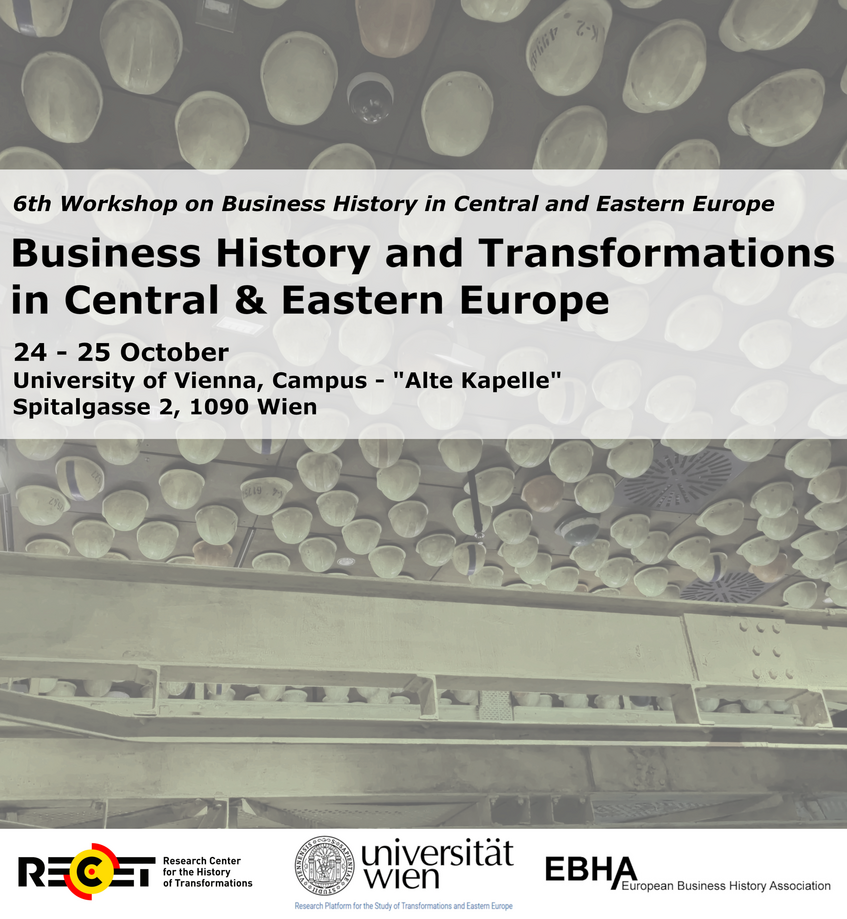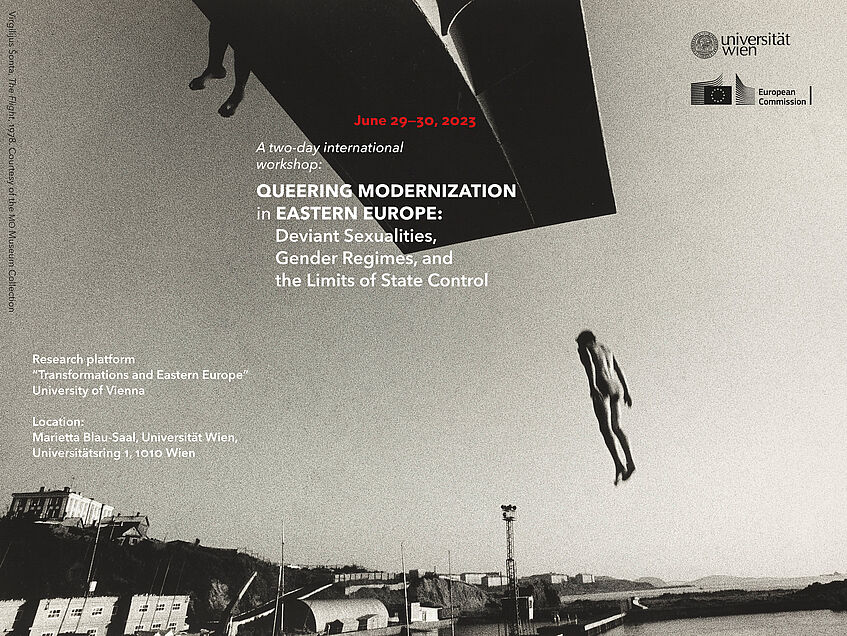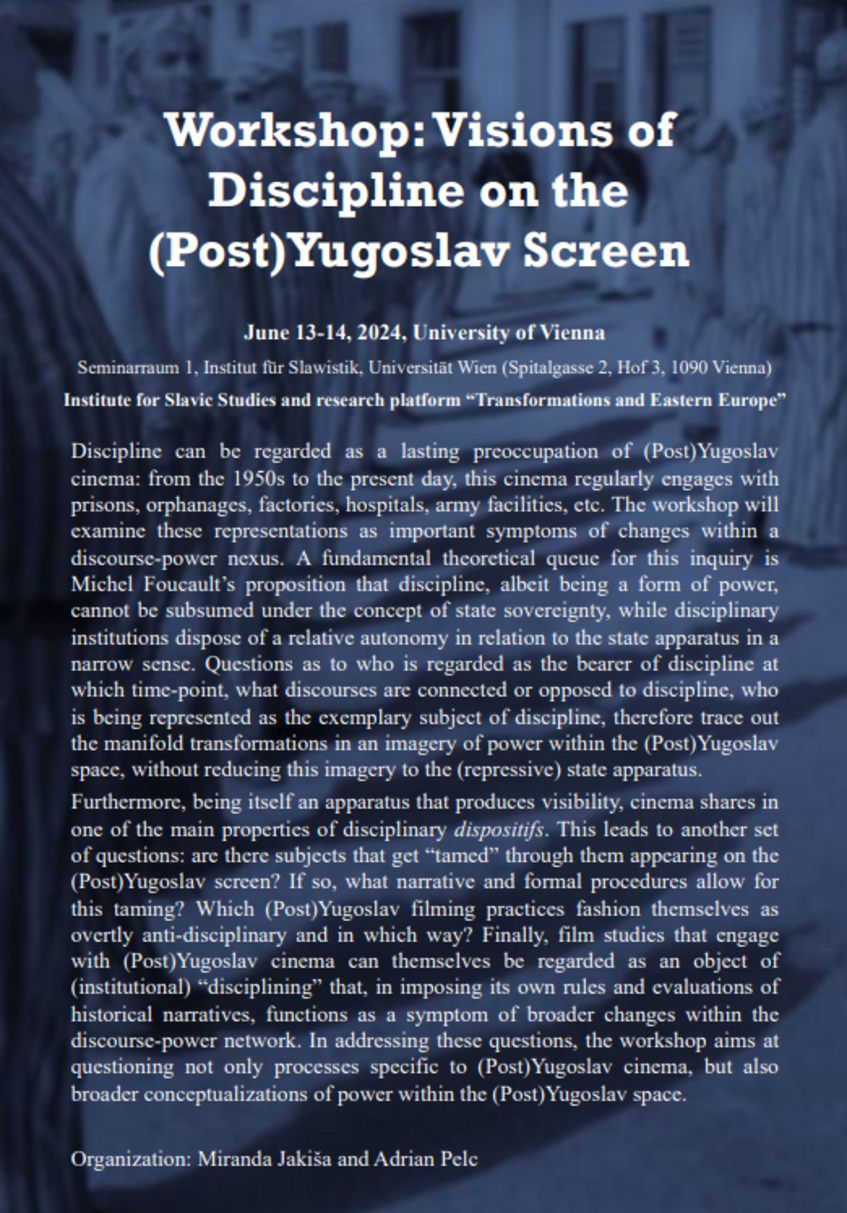Workshop: Business History and Transformations in Central & Eastern Europe

Download the full programme here
This year’s workshop focuses on the variety of challenges that enterprises and entrepreneurs had to cope with during times of significant political, economic, social, and cultural changes and upheavals in the region of CEE from the 19th century to the early 21st century. We recognize the events of the revolutionary uprisings across CEE in 1848/49, the Austro-Hungarian compromise of 1867, the (re)emergence of new states in CEE after the end of the First World War 1918, the rise of state-socialist dictatorships in CEE after 1945, or the systemic transformations of 1989-91 as profound turning points in the history of CEE. However, we also agree that these events cannot be reduced to isolated “numeric keywords” as they were rather peaks of longer-lasting processes of change(s). We thus refer to concepts of transformation that emphasize transformation as a process of “accelerated” political, economic, and societal change with an often “unspecified” time frame of its beginning and its end. Although there is a scholarly consensus that entrepreneurship is an important driver of transformational processes, the question of "how entrepreneurs initiate, contribute to, prevent, or foster transformation in markets and societies" remains largely unexplored. This question also applies to the role of companies and their various stakeholders in transformation processes.
The workshop intends to make an important contribution to filling this research gap and the organizers are thus welcoming proposals that fit the general scope of the workshop; however, we are especially interested in proposals addressing one or more of the following (interlinked) topics:
Transformations & enterprises from a long-term and global perspective
We are looking forward to analyses of linkages between business in CEE and (global) political, economic, societal and cultural changes and the question of companies and entrepreneurs as important actors and respondents of transformations. Case studies of dis/continuities in (long-term) histories of companies and entrepreneurship related to fundamental transformations in CEE are thus welcomed. We particularly welcome proposals that consider fundamental economic policy shifts related to transformations, such as collectivization, market liberalization and/or economic nationalism and their impacts on business in CEE. As the comparison of different historical transformations in CEE provides an interesting object of research (Ther 2014), we appreciate case studies with comparative approaches.
Business practices and transformation / Transformations of business practices
The focus here is on particular business practices: How did transformations influence business practices on the one hand, and how did they themselves contribute to the dynamics of changes on the other? Specifically, we welcome papers that deal with questions about (entrepreneurial) re/actions to changing political, social, and cultural contexts around businesses as well as forms of adaptation, resistance and/or resilience to change(s). How business organizations maneuvered through transformational periods and how agencies of various business actors can be embedded analytically in larger (macro-level) contexts of systemic transformation?
Transformation “from below”
We also encourage involving non-salient stakeholders of business organizations other than top management as important historical actors of transformations, particularly labour. We hereby want to consider shifting power relations between various stakeholders in business organizations in the course of transformations in CEE and/or in its aftermath. We are interested in proposals that explore new forms of grassroots activities related to business in times of accelerated political, economic and social change(s) and their impact on such changes. Accordingly, (new) forms of social upward mobility as well as new or persisting inequalities (in its intersectional dimension) related to business and transformations in CEE are to be scrutinized.
Retrospective perceptions of transformations
Lubinski et al. (2023) suggest combining the “temporality of transformation” from the following two-time perceptions: “Over time”, as a retrospective that assesses transformation according to its consequences and “in time”, as the "prospective" perception of transformation of business actors and their associated ideas of imagined future(s). Accordingly, we invite proposals dealing with retrospective perceptions of various corporate actors on transformations. How are transformations told in corporate narratives, and how are these narratives shaped by corporate museums, corporate books, and (business) archives? On the other hand, how did other stakeholders, such as ordinary employees, reflect on their experiences in enterprises during times of accelerated change/s?
Queering Modernization in Eastern Europe: Deviant Sexualities, Gender Regimes, and the Limits of State Control

June 29-30, 2023
Research platform "Transformations and Eastern Europe"
University of Vienna
Location: Marietta Blau-Saal, Universität Wien, Universitätsring 1, 1010 Wien
This two-day workshop invites doctoral students and postdoctoral researchers to reflect on the impact that the modernization of states and societies in Central and Eastern Europe (CEE) had on the construction of sexual and gender identities and experiences, as well as the notion of sexual deviance. While the 20th century was marked by increasingly modern (secular, science-based, medicalized, etc.) conception of sexuality across Europe, this new understanding interacted in complex ways with traditional and religious notions of morality and sin. Furthermore, the twentieth century in CEE was marked by multiple regime and ideological changes, which also impacted the ways people lived and understood their personal lives, gender identities, and sexual experiences. Considering the limitations of the Foucauldian narrative of the history of sexuality in the West, the workshop invites participants to reflect on the methodological and theoretical tools that are needed to interrogate the continuity and change of sexual discourses and practices in CEE.
In particular, the workshop invites participants to reflect: Can we see gender as one of the central categories of analysis in understanding the construction of hetero- and cis- normativity and morality, even in societies which prided themselves on achieving gender equality? How do we approach the categories of class and race in relation to sexuality, when talking about CEE region, which experienced modernity largely in its state-socialist form and had a peripheral role in the global history of colonialism and imperial expansion? How did the modernizing institutions of medicine, science, law, police, and other state and non-state actors participate in creating some subject positions as socially acceptable, while others as deviant in CEE countries? In what ways did queer people experience, pursue, and express their desires in modernizing societies, and how can we research, understand, and commemorate them from a contemporary perspective? What can we learn about modern CEE societies and politics when applying queer and feminist theoretical instruments?
Situated within the vibrant field of historical research into non-normative sexualities and genders in CEE, this workshop invites doctoral students and postdoctoral researchers to discuss the newest findings regarding the history of state regulation of deviant sexualities as well as the traces of queer creativity and resistance. It aims to create a platform for a theoretically and conceptually oriented discussion and will result in a publication of a special issue of a peer-reviewed journal.
Download the full program here.

